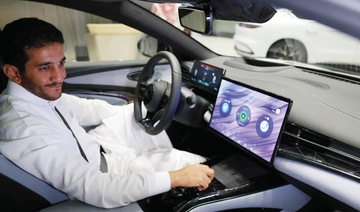Saudi Arabia Drives Towards Electrified Future, Luring Global Automakers and Powering Economic Growth
As the world’s leading oil producers, Saudi Arabia has traditionally been associated with the fossil fuel industry. However, the Kingdom is now rapidly shifting its focus towards an electrified future, driven by the ambition to become a global leader in the electric vehicle (EV) market under its Vision 2030 roadmap. With billions of dollars being poured into infrastructure development and investments in cutting-edge technology, Saudi Arabia is making significant strides in creating a comprehensive EV ecosystem that will not only propel economic growth but also reduce its reliance on oil exports.
Creating a Comprehensive EV Ecosystem
Saudi Arabia’s government has set ambitious targets to achieve 30 percent electrification of vehicles in Riyadh by 2030. To achieve this goal, the Kingdom is investing heavily in various aspects of the EV value chain, including infrastructure development, supply chain localization, and technological innovation. Heiko Seitz, PwC Global and Middle East eMobility leader, emphasized that Saudi Arabia’s focus on creating a self-sufficient automotive supply chain is a key strategy to solidify its position in the global EV industry.
"The Kingdom is leveraging its $2.5 trillion in untapped mineral reserves to ensure it has access to critical resources needed for production," Seitz noted. "With significant investments, such as $3.4 billion in Lucid Motors to produce 155,000 EVs annually and a $5.6 billion agreement with Human Horizons, the Kingdom is attracting global automakers and building a competitive manufacturing base."
Attracting Global Automakers and Building Competitiveness
Saudi Arabia’s investments in EV production and battery supply chains have attracted significant interest from global automakers. Mazin Jameel, managing director of marketing operations at Abdul Latif Jameel Motors, highlighted the importance of partnerships between public and private sectors to drive innovation in the automotive sector.
"The Kingdom is introducing regulatory frameworks, financial incentives, and policy support to accelerate EV adoption among consumers," Jameel said. "These steps reflect Saudi Arabia’s comprehensive approach to fostering a sustainable and future-ready transportation ecosystem."
Integration of Artificial Intelligence and Automation
As part of its efforts to enhance production efficiency, the Kingdom is integrating artificial intelligence (AI) and automation into the automotive sector. Seitz emphasized that this move will help optimize supply chain management and improve vehicle efficiency.
"The integration of AI-driven analytics in EV production will position Saudi Arabia at the forefront of next-generation mobility innovation," Seitz said.
Private Sector Partnerships Driving Growth
The Kingdom is not solely relying on government investment to propel the EV industry forward. Private sector partnerships are playing a crucial role in driving growth and development, as highlighted by Ahmad Al-Tawbah, CEO of Motory.
"Initiatives like the establishment of advanced manufacturing zones, such as NEOM and KAEC, showcase how public-private partnerships can create a thriving ecosystem for automotive assembly, EV production, and battery manufacturing," Al-Tawbah said. "PPPs are crucial in reshaping the supply chain ecosystem by encouraging local suppliers to integrate into the global automotive value chain."
Job Creation and Economic Growth
Saudi Arabia’s booming EV sector has significant potential to deliver tens of thousands of jobs in engineering, manufacturing, logistics, and software development, directly supporting Vision 2030’s objective of increasing employment. Abdul Latif Jameel Motors’ Jameel emphasized that the automotive ecosystem will provide opportunities for local entrepreneurs and small businesses to participate in the supply chain at all levels of manufacturing, distribution, and related logistics.
Scaling Up Saudi Arabia’s Automotive Sector
The Kingdom is making significant investments in workforce upskilling, with over 600,000 Saudis set to benefit from education and training programs. Seitz emphasized that specialized programs in EV technology, battery science, and smart mobility solutions are being developed in collaboration with leading universities and research institutions.
"Workforce development is a priority for the Kingdom," Seitz said. "The local workforce needs to be equipped with the expertise needed to drive innovation in the automotive sector."
Conclusion
Saudi Arabia’s ambitious drive towards an electrified future presents significant opportunities for growth, innovation, and economic diversification. By creating a comprehensive EV ecosystem, attracting global automakers, and integrating AI and automation, the Kingdom is solidifying its position as a global leader in the electric vehicle market under Vision 2030. With massive investments, a prime geographic location, and a strategy that blends innovation with economic muscle, Saudi Arabia is poised to take pole position in the global EV industry.

